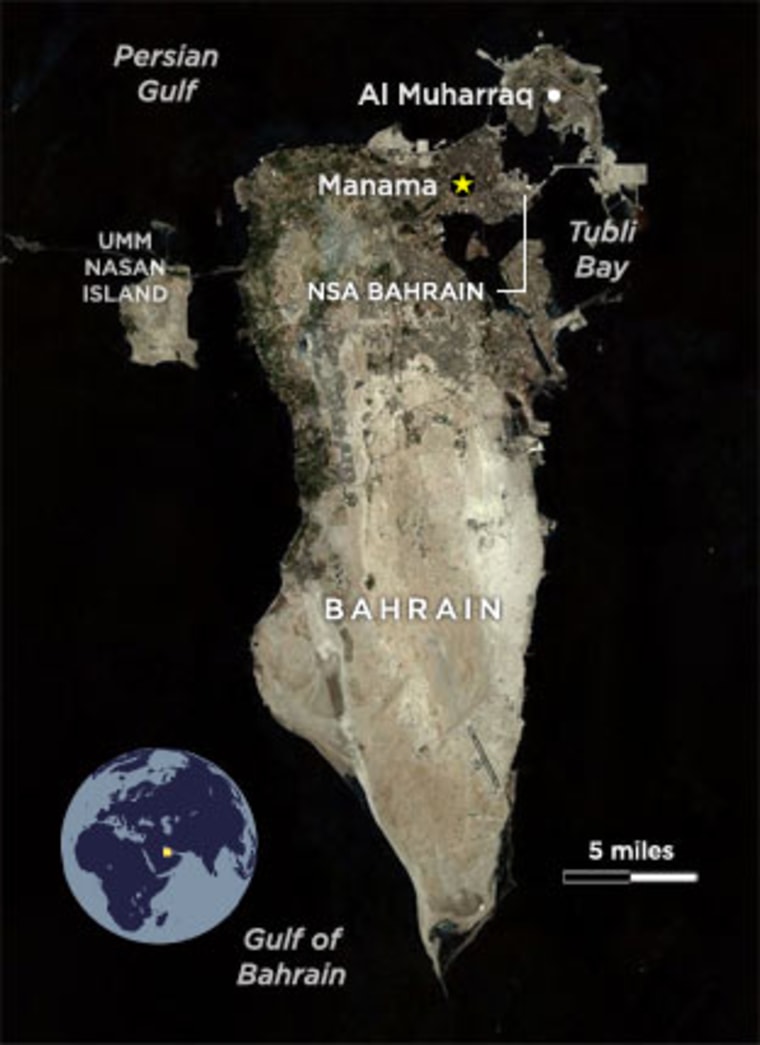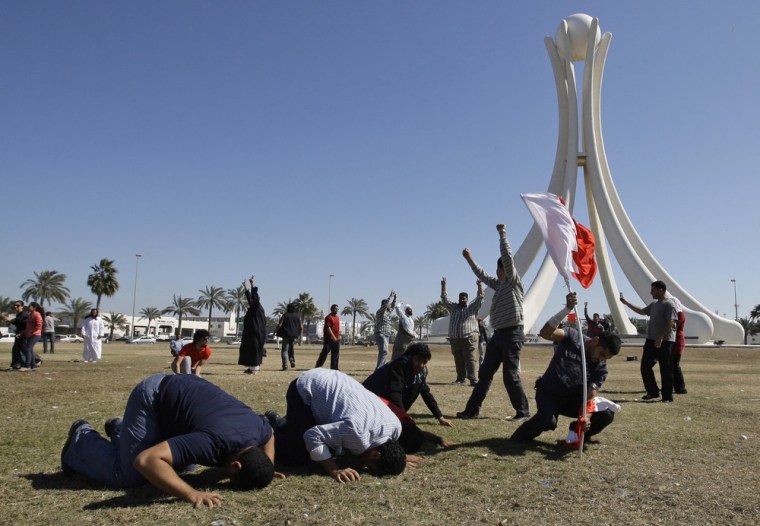Anti-government protesters in Bahrain swarmed back into a symbolic square on Saturday, putting riot police to flight in a striking victory for their cause and confidently setting up camp for a protracted stay.
Crowds had approached Pearl Square in Manama from different directions, creating a standoff with riot police who had moved in earlier to replace troops withdrawn on royal orders.
Suddenly police raced to their buses, which drove away mounting kerbs in their haste to escape.
Emboldened protesters, cheering and waving national flags, ran to the center of the traffic circle, retaking it even before all police had left.
"We are victorious!" they chanted as they marched back into the square.
The crowd waved fleeing policemen through.
"We don't fear death anymore, let the army come and kill us to show the world what kind of savages they are," said Umm Mohammed, a teacher wearing a black abaya cloak.
On orders from the crown prince, troops and armoured vehicles earlier withdrew from the square, which they had taken over on Thursday after riot police staged a night-time attack on a sit-in by protesters, killing four people and wounding 231.
The crowds in Pearl Square soon swelled into the tens of thousands, celebrating a triumph for the mostly Shiite protesters who took to the streets on Monday, inspired by popular revolts that toppled leaders in Egypt and Tunisia.
The authorities had been determined to prevent protesters from turning Pearl Square into a base like Cairo's Tahrir Square, the heart of a revolt that ousted Egypt's Hosni Mubarak.
'We liberated a small part of Bahrain today'
Tents, removed two days ago by the army, were set up again along with makeshift medical stations to treat any wounded.
"We liberated a small part of Bahrain today. We will liberate all of Bahrain," a man in the square said.
Bahrain's 70 percent Shiite majority long has felt discriminated against in the Gulf Arab island that is ruled by a Sunni Muslim dynasty and is a close U.S. and Saudi ally.
Shiites feel cut out of decision-making and complain of unfair treatment in access to state jobs and housing.
Sixty to 80 people were taken to Salmaniya hospital after being affected by teargas or hit by rubber bullets, a doctor said. He said the hospital was full and did not have enough oxygen to deal with the rush of casualties.
More than 60 people were in the hospital with wounds sustained on Friday when security forces fired on protesters as they headed to Pearl Square, then still in military hands.
Protesters on Friday described a chaotic scene of tear gas clouds, bullets coming from many directions and people slipping in pools of blood as they sought cover. Some claimed the gunfire came from either helicopters or sniper nests.
"Police attacking protesters here at hospital in Bahrain. Tear gas inside. Panic," tweeted New York Times reporter Nicholas Kristof. Another message on his Twitter account read: "Patients pouring into ER, along w tear gas. Chaos. Tr gas grenades thudding in bckground."
"People started running in all directions and bullets were flying," said Ali al-Haji, a 27-year-old bank clerk. "I saw people getting shot in the legs, chest, and one man was bleeding from his head."
"My eyes were full of tear gas, there was shooting and there was a lot of panic," said Mohammed Abdullah, a 37-year-old businessman taking part in the protest.

Mohammed, a 28-year-old banker who lives in Bahrain’s capital and asked that his last name not be printed out of fear for his safety, said the medical complex by Pearl Square was overwhelmed.
“There is blood everywhere,” he said. “Most of the shots are to the chest and the head. They were shot to kill; they were not shot to break down their gathering.”
The gunfire started as protesters joined funeral mourners in Pearl Square, carrying flowers to honor the dead.
“As soon as they approached, there was gunfire,” he told msnbc.com from his home in Manama, too afraid to go outside during the clashes. “My friend is just two blocks away, and he saw people falling. I have another friend who told me it’s explosive chaos.”
Bahrain's crown prince called for a national day of mourning "for the sons we have lost," the state news agency reported.
Crown Prince Salman bin Hamad Al Khalifa, deputy supreme armed forces commander, called for calm, asking citizens to unite and cooperate with all political forces in the country.
"I stress, once more, that our duty is to preserve security and stability, to ensure that there is no discord and that the situation does not worsen," he said in a statement.
About the causes of the unrest, the crown prince, seen as a reformist, told Al Arabiya television: "Maybe, in summary, there is a feeling that some basic demands have not been met. We want to correct this situation and prevent its repetition."
After troops had been ordered off the streets, police were to keep order, but people power proved too strong in Pearl Square.
Some people kissed the ground in joy or started praying.
"We took this square in a peaceful manner. The Khalifa henchmen, they killed my friends here," a protester said.
Hundreds of women in long black robes screamed "Down, down Khalifa" repeatedly outside Salmaniya hospital on Saturday.
President Barack Obama spoke to the king on Friday, condemning the violence and urging the government to show restraint and respect the rights of its people.
The crown prince's orders to withdraw the military from the streets were issued a few hours later.
"That's a very positive step," Jasim Hussain, a member of the main Shiite Wefaq bloc that quit parliament on Thursday, told Reuters. "They're trying to ease the tensions. I don't know whether it will be sufficient."
Wefaq earlier had rejected the king's dialogue offer, saying troops must be withdrawn first, among other conditions.
Another Wefaq lawmaker said the troop pullout was not enough by itself. "There's no difference if people are killed by the military or by the security forces," said Ibrahim Mattar.
"We hope to hear a clear message from the government that it will stop killing people who are protesting peacefully."
Mattar said the king must accept the concept of constitutional monarchy, as well as withdrawing the military.
"Then we can go for a temporary government of new faces that would not include the current interior or defense ministers."
He reiterated an opposition demand for the king to fire his uncle, Sheikh Khalifa bin Salman al-Khalifa, prime minister since Bahrain gained its independence in 1971.
Bahrain, a minor oil producer, has long been a military ally of the West. A naval base near Manama that hosts the U.S. Navy's Fifth Fleet helps the United States to project power across the Middle East and Central Asia, including Iraq and Afghanistan.
A fleet spokesman said there was no significant impact on operations and Jennifer Stride, spokeswoman for the U.S. naval base, said no evacuation of families was planned.
The United States is caught between the desire for stability in an ally seen as a bulwark against Iran and the need to uphold the people's right to express their grievances.
